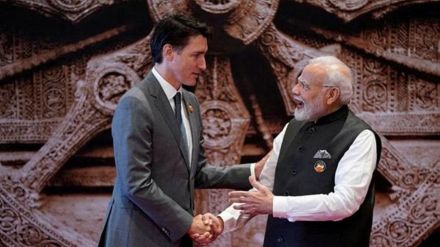In a high-stakes encounter on the sidelines of the G-20 summit in New Delhi, Prime Minister Narendra Modi and his Canadian counterpart, Justin Trudeau, engaged in a pointed exchange of concerns, underscoring the delicate nature of their diplomatic relations. Both leaders, in their respective statements following the meeting, highlighted the persisting disparities between their nations.
Prime Minister Modi conveyed India’s “strong concerns” regarding the presence of “extremist elements in Canada.” The Ministry of External Affairs issued a statement detailing these apprehensions, asserting that these elements were actively promoting secessionism, inciting violence against Indian diplomats, and vandalizing diplomatic premises. The statement further linked these groups to organized crime, drug syndicates, and human trafficking, emphasizing the urgency of bilateral cooperation to address these threats.
On the other side Prime Minister Trudeau raised the issue of “foreign interference” in Canadian elections, a matter his government has previously attributed to intelligence agencies from various countries, including India. This issue has ignited a significant controversy within the Canadian Parliament, particularly after the Canadian National Security Advisor, Jody Thomas, disclosed that a report had identified “state actors and proxies” from countries such as China, India, Iran, and Russia meddling in national politics and elections.
In response, Trudeau underlined Canada’s firm commitment to freedom of expression, conscience, and peaceful protest while reiterating the importance of preventing violence and countering hatred. He highlighted that the actions of a minority should not be misconstrued as representative of the entire community or nation. Additionally, Trudeau underlined the importance of respecting the rule of law and addressing concerns related to foreign interference.
This tense encounter reflects the frosty relations between the two leaders, which have been strained over several issues, including India’s concerns about Khalistani extremism in Canada, violence against the Indian diaspora, and criticism of India’s handling of the Farm Bill protests. Moreover, the recent decision by Canada to pause trade ties and the Free Trade Agreement negotiations has added to the friction.
In the lead-up to the G-20 Summit, Trudeau’s communication with Ukrainian President Volodymyr Zelenskyy raised eyebrows in Delhi, as he expressed disappointment over being “excluded” from the summit. Even the scheduling of the Modi-Trudeau meeting appeared contentious, with the Canadian side requesting a meeting time only late on Saturday. Trudeau also skipped an official banquet, citing scheduling reasons.
Addressing questions from media persons about the perceived tension between the two leaders, the Canadian leader acknowledged that India held immense economic significance globally and remained a critical partner for Canada on various fronts. Despite their differences, he maintained that he and Modi had a “good relationship” and were adept at discussing complex issues.
